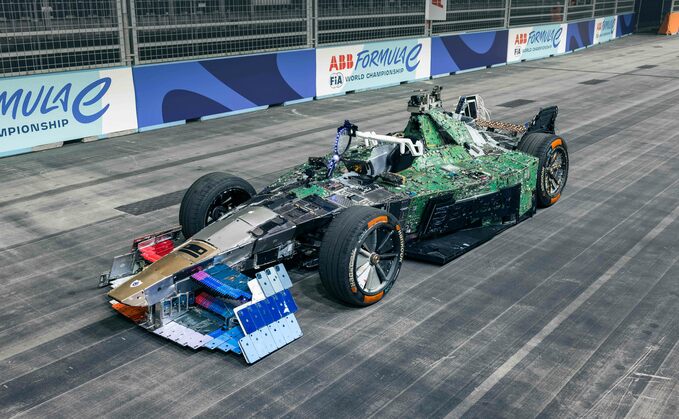
ABB FIA Formula E world championship winners reveal e-waste racing car built from products donated by Music Magpie and school children
The winners of the latest ABB FIA Formula E world championship, Envision Racing, has unveiled a full-size, drivable race car made entirely from electronic waste.
Debuted on the eve of last month's London e-prix, the Gen3 'Recover-E' car was built in tandem with British artist and designer Liam Hopkins using old iPhones, circuit boards, and other electronic devices donated by Music Magpie and school children.
According to recent research, annual e-waste is on track to reach 75 million tonnes by 2030, with the UK the second largest disposer of disposable vapes, mobile phones, laptops, music players, and batteries in 2022.
As such, the new car will form part of a wider campaign from Envision Racing to highlight the impact of e-waste and promote the importance of recycling and re-use. For example, the Envision Group-owned team has partnered with Cartoon Network and Warner Bros to engage children and young people with its Race Against Climate Change programme and launched a new Recover E Waste to Race competition challenging students to create their own car made out of recycled electronic materials.
Sylvain Filippi, Envision Racing's managing director and chief technical officer, said that alongside testing new battery technology for cars, the team is on a mission to tackle e-waste and ensure the precious metals, minerals, and materials in old laptops, mobile phones, and other electrical devices are extracted and reused.
"If the millions upon millions of lithium batteries that are found in vapes and other products are recycled, it will dramatically reduce both the need for rare earth mineral mining and the large energy needed to create the batteries from scratch," he said. "We want to increase awareness of e-waste and help build a ‘circular economy' where electrical products are reused or recycled, not thrown away."
Hopkins added that the design and creativity demonstrated in the launch of the 'Recover-E', had the potential to both highlight the issue of e-waste and demonstrate its potential to accelerate the creation of a circular economy.
"Unfortunately today we choose to discard and replace electronics instead of repairing and recycling them leading to a global e-waste crisis," he said.